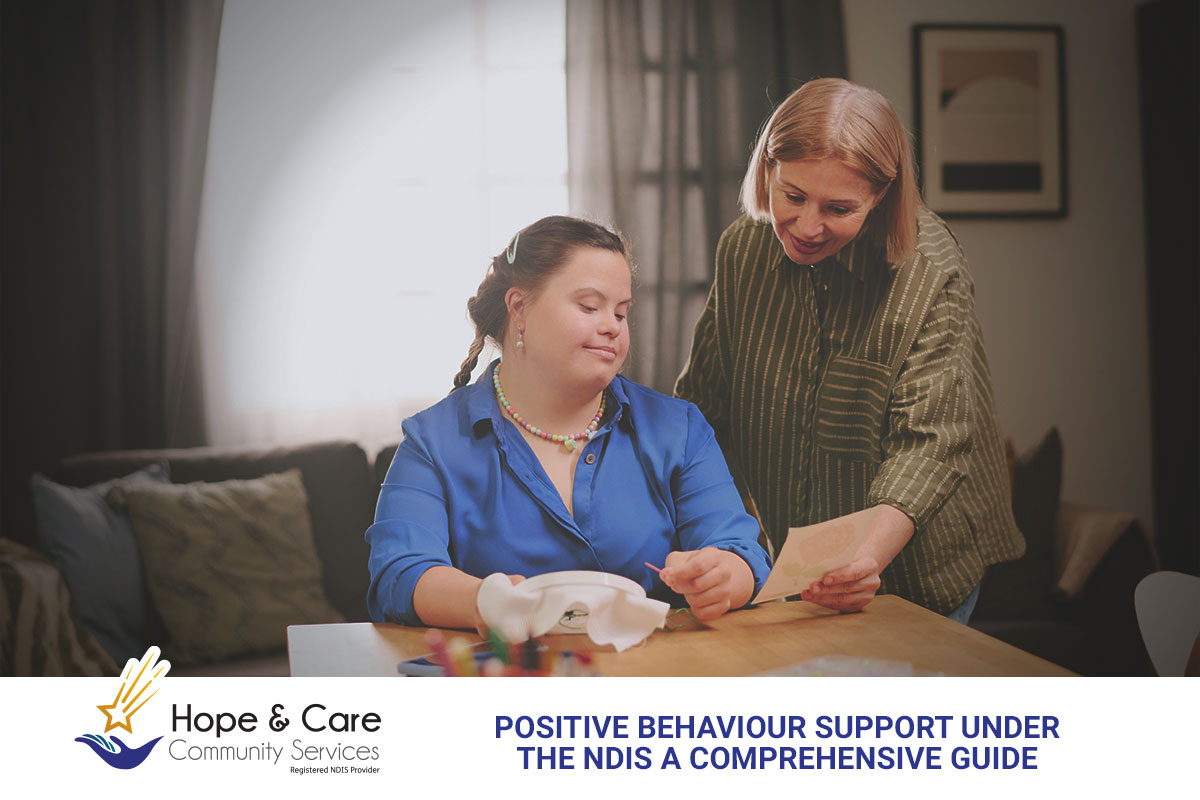
Under the National Disability Insurance Scheme (NDIS), PBS plays a crucial role in empowering participants, promoting independence and enhancing social inclusion. In this guide, we will explore how Positive Behaviour Support works under the NDIS, its key benefits and how participants can access funding for these services.
What Is Positive Behaviour Support (PBS)?
Positive Behaviour Support (PBS) is an evidence-based approach that helps individuals with disabilities manage behaviours of concern in a safe and supportive way. Rather than focusing on punishment or control, PBS identifies the root causes of challenging behaviours and provides individuals with the skills and strategies needed to express themselves positively.
PBS is particularly beneficial for NDIS participants who experience difficulties with communication, emotional regulation, or social interactions.
Understanding Behaviours of Concern
Behaviours of concern, also known as challenging behaviours, occur when an individual struggles to express their needs, emotions, or frustrations. These behaviours can impact daily life, relationships and social participation.
Common Examples of Challenging Behaviours
- Verbal or physical aggression
- Self-injurious behaviours (biting, scratching, head-banging)
- Property destruction
- Social withdrawal or refusal to participate in activities
- Repetitive or obsessive behaviours
What Causes Challenging Behaviours?
Behaviours of concern often result from unmet needs, environmental stressors, or communication barriers. Some of the most common causes include:
- Communication difficulties – Individuals may struggle to express their emotions, wants, or discomfort.
- Sensory sensitivities – Bright lights, loud noises, or crowded spaces can be overwhelming.
- Routine disruptions – Unexpected changes in schedules can cause stress and anxiety.
- Medical or psychological factors – Pain, anxiety, trauma, or other mental health challenges may contribute to behaviours of concern.
Instead of just managing these behaviours, PBS helps individuals develop alternative coping strategies to express their needs in a healthier way.
How Positive Behaviour Support Works
PBS is a person-centred, proactive and skill-building approach designed to help individuals manage behaviours effectively. The core principles of PBS include:
Individualised and Person-Centred Support
Every individual is unique, so PBS strategies must be tailored to meet their specific needs, strengths and personal goals. Customised behaviour support plans ensure that strategies are effective and meaningful.
Understanding Behaviour as Communication
Instead of seeing challenging behaviours as a problem, PBS recognises them as a way of expressing needs. By identifying the root cause of the behaviour, we can introduce alternative communication methods that reduce frustration and distress.
Teaching Alternative Skills
PBS helps individuals develop new skills that replace challenging behaviours. These skills may include:
- Alternative communication methods (e.g., sign language, picture exchange systems).
- Social skills to improve interactions and relationships.
- Emotional regulation techniques to manage stress and frustration.
Proactive and Preventative Strategies
Rather than reacting to behaviours when they occur, PBS focuses on preventing them from happening. Effective strategies include:
- Creating structured routines to provide consistency and reduce anxiety.
- Offering choices and autonomy to promote independence.
- Modifying environments to reduce sensory triggers.
Collaboration with Families and Support Networks
PBS is most effective when families, caregivers, educators and support workers work together. A consistent approach across home, school and communitysettings leads to better long-term outcomes.
Creating a Positive Behaviour Support Plan (PBSP)
A Positive Behaviour Support Plan (PBSP) outlines specific strategies and interventions to support individuals in managing behaviours of concern. It includes:
Conducting a Functional Behaviour Assessment (FBA)
A Functional Behaviour Assessment (FBA) helps identify triggers, patterns and underlying causes of challenging behaviours. This process involves:
- Observing the individual in different environments.
- Consulting with caregivers, family members and support workers.
- Identifying behavioural patterns and triggers.
Implementing Proactive Strategies
Once we understand what causes certain behaviours, we introduce positive behaviour strategies to support the individual. These may include:
- Teaching alternative communication methods to help individuals express themselves.
- Making environmental adjustments to reduce stress and sensory overload.
- Using structured routines and visual aids to create stability.
Managing Crisis Situations with De-escalation Techniques
If challenging behaviours arise, we apply evidence-based de-escalation strategies to ensure safety and reduce distress. These include:
- Redirecting attention to a preferred or calming activity.
- Encouraging relaxation techniques like deep breathing.
- Using positive reinforcement to encourage desirable behaviours.
Ongoing Monitoring and Plan Adjustments
PBS is an ongoing process. Behaviour support plans must be regularly reviewed and adjusted to ensure they remain effective as the individual’s needs evolve.
Restrictive Practices and NDIS Safeguards
Restrictive practices involve limiting a person’s rights, choices, or movement and should only be used as a last resort when all other strategies have failed. These include:
- Physical restraint – Restricting a person’s movement.
- Seclusion – Isolating an individual from others.
- Chemical restraint – Using medication to control behaviour.
To learn more, visit the NDIS Commission website: www.ndiscommission.gov.au.
How to Access NDIS Funding for Positive Behaviour Support
PBS services are funded under the NDIS, allowing participants to access professional behaviour support. Participants can use their NDIS funding under:
Capacity Building Supports – Improved Daily Living
- Supports skill development and independence.
- Covers funding for therapy, training and behaviour support services.
Improved Relationships
- Provides funding for specialist behaviour support.
- Helps participants build stronger relationships and improve social interactions.
How to Get PBS Support Under the NDIS?
Participants should discuss their PBS needs with an NDIS planner or support coordinator to ensure they receive the appropriate funding in their plan.
Final Thoughts
Positive Behaviour Support under the NDIS is a powerful tool that helps individuals with disabilities develop essential life skills, enhance independence and improve social interactions. By understanding behaviours, teaching new skills and using proactive strategies, PBS ensures NDIS participants receive the support they need to lead a fulfilling and meaningful life. At Hope & Care Community Services, we specialise in providing NDIS-funded Positive Behaviour Support that helps individuals develop life skills, build confidence and achieve independence.
Want to learn more? Read other articles :
- Redefine Independence your own way – with HCCS
- Who’s Who: The Key Terms of Your NDIS Plan
- Foundational Supports: Building Blocks of NDIS Success
HCCS is a registered NDIS provider. Learn more about our services.
♥ We are available in Brisbane! – Our team is just a call away!
